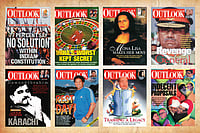And not found their stories alien? Even fantastical? Memory magnified, pain and prejudice personified. But surely theirs was the rhetoric rather than the record of history as WE knew it? Easy, staccato statistic. Dramatis personae: Nehru, Gandhi, Jinnah, Mountbatten, communal riots, twelve million displaced, 75,000 women raped/ abducted/ impregnated. Like Butalia however, we wondered. Where did the individual angst we saw being relived all our adult lives belong? Did the generality of history exclude the inclusion of that particularity? Or were we subcontinentals, unlike the survivors of the Jewish Holocaust, not ready to "process" and narrate the individual experiences that constitute what Butalia calls the "underside" of history? Fearful, unable to deal with the memories that might unstopper? Did we agree with writer Krishna Sobti that Partition was "difficult to forget but dangerous to remember"?
Fifty years after the event, as a people seem emotionally more equal to the exercise, Butalia makes bold to address these questions, provide some answers. Repeat partitions: communal as in '84, religious/political as during Babri '92, make it imperative this be done. Everyman voices, published documents, are tellingly juxtaposed, the jigsaw is pieced together, another perspective is offered on the processes at play during that time. She explodes the fervently propagated myth of pre-Partition communal amity, reveals the RSS's astoundingly communal propaganda, highlights the every-man's naive need to believe, like her interviewee Rajendra Singh, "raje maharaje badalte hain, praja thodi badalti hai" even as communal mayhem rages around them.
A people overtaken by events refused to believe in their impending desolation and displacement till it was inevitable. And horribly late. Amity myths are torn asunder. "If a Mussalman was coming along the road and we shook hands with him and had a box of food in our hand, that would then have become soiled; we would not eat it; if we are holding a dog in one hand and food in the other there's nothing wrong with that food," recalls Hindu refugee Bir Bahadur. "We treated them so badly. This is the reason Pakistan was made."
Butalia highlights the RSS's contribution to the creation of a noxious mindset and its obnoxious aftermath. A 1947 issue of RSS mouthpiece Organiser cautioned "virtuous" Hindu men against potential Muslim seductresses: "...even in your house you are not safe. Muslim women would enter your house on the pretext of enquiring if you have anything to sell" and of course worse than death would follow! Muslim males were all potential rapists: "abduction of women, a notorious and age-old practice of Muslims, made the Nation writhe in pain and anguish". Message: Hindu males were unsuspecting innocents, Muslim men: genetically predisposed to be so. Facts, as Butalia shows us, were different.
Facts many of us are now more emotionally adequate to face up to. Like the RSS worker who tells Butalia of the time he heard a Muslim woman being raped and then killed, as he stood nearby unwilling to help. Fifty years later he breaks down recalling that horrible memory. "We were taught," he weeps, "to not feel anything for THEM."
Butalia's strength lies in her perceptive analysis and sensitive focus on the tragic fates, inner lives and spaces, the stifling of people that fell through the cracks of history: women, children, Dalits. Listen not to what the women say but rather what they cannot and will not say, she urges, ponder whether women "martyred" at the hands of their menfolk to "save their honour" were not in fact petrified people who may have wanted to live if they were viewed as independent entities rather than "honour", "possession". Possessions briskly traded and bartered, "confiscated" and "released" between the two governments a good five years after the Partition. Many had built or reconciled to their new lives, yet others fearing ostracism were loth to return. And yet governments herded them across the border. "Religion", "possession", "honour" were important. Individual will? Never. What happened, asks Butalia, to the countless kids: left behind, kidnapped, sexually abused?
And what of the Dalits? The untouchables were denied entry into refugee camps. Apartheid persisted despite the horrific apocalypse it brought on. Alienated, secure in their outcastedness Dalits like Maya whom Butalia recounts meeting revelled in their marginality: looted abandoned homes secure in the knowledge that they would be immune in what was, as they saw it, a caste conflict between Hindus and Muslims. In which knowledge, of course, lay the seeds of this community's future political awakening.
The image that will stay for a long time is of Butalia's Rana Mama, the Hindu uncle who stayed back in Lahore so he could be sole inheritor of his family's Lahore haveli. He struck a Faustian bargain with a new faith, a new country. Was accepted by neither. He lives on plagued by a crisis of faith. Not unlike his two parent countries that were founded on the unfortunate premise of two faiths, two people.


























